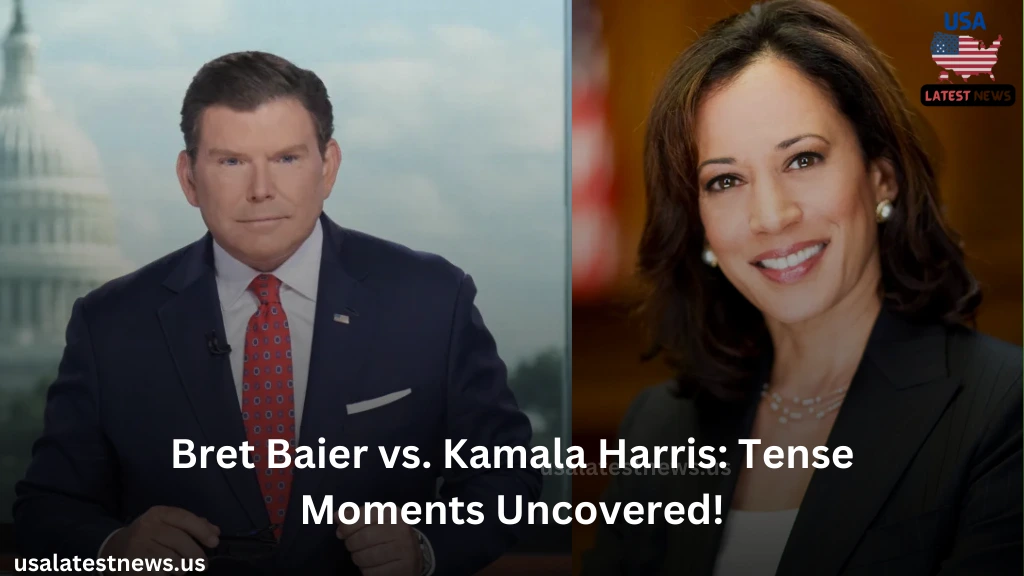Kamala Harris Interview: In a politically charged landscape, few moments are as riveting as a high-stakes interview between a seasoned journalist and a top political figure. Recently, Fox News host Bret Baier faced off against Vice President Kamala Harris, marking her first appearance on the network since becoming the Democratic nominee. What transpired during this intense exchange not only captivated viewers but also sparked widespread discussion across social media platforms.
The Tension Builds: A Late Arrival
The interview was scheduled for 5 p.m., but Harris arrived a notable 15 minutes late. Baier described this delay as a tactic reminiscent of “icing the kicker” in football—a strategic move designed to gain an advantage. “We were supposed to start at 5 p.m.,” Baier explained, “but the plan kept getting trimmed back. When the vice president finally arrived at about 5:15 p.m., we had to scramble to make it work for the 6 p.m. airing.” This late arrival set an uneasy tone for the interview, foreshadowing the challenges that lay ahead.
Navigating the Political Minefield
From the outset, it became evident that Baier was in for a tough ride. As the conversation turned to critical topics such as immigration, Baier found himself frequently interrupting Harris to steer the discussion. The vice president’s responses were often lengthy, making it increasingly difficult for Baier to maintain control. “I could tell right from the start that redirecting her would be challenging without cutting in,” he remarked, recalling a similar experience during an interview with former President Barack Obama.
A Dance of Discourse
Baier’s interview style was put to the test as he sought to keep Harris on track. Throughout the discussion, he emphasized the importance of direct answers to pressing questions. “I once told Obama, ‘Mr. President, I know you like to filibuster,’” Baier quipped, highlighting the fine line between allowing politicians to express their views and ensuring the conversation remains focused.
As the dialogue progressed, the tension in the studio grew palpable. Harris, known for her articulate and measured responses, often found ways to pivot back to her key messages. This led Baier to express frustration over the lack of follow-up opportunities. “It’s tough when you have so much to ask, but the conversation keeps getting diverted,” he noted.
The Clock is Ticking: Signs of Conclusion
As the interview approached its final moments, Baier noticed that members of Harris’s team were signaling for the discussion to wrap up. “I’m talking about four people waving their hands, indicating it needed to end,” he explained, adding a hint of irony. Despite the urgency from her team, Baier saw the value in having Harris engage in more interviews of this nature. “Maybe she should do more of these,” he suggested, recognizing that transparency and engagement could benefit her public image.
The Social Media Storm: Trump Weighs In
In the aftermath of the interview, reactions flooded social media, with former President Donald Trump being one of the first to respond. He took to X (formerly Twitter) to express his views, stating, “Great job by Bret Baier in his interview with Lyin’ Kamala Harris.” Trump’s commentary didn’t stop there; he launched a full-frontal critique of Harris’s performance, accusing her of suffering from “TRUMP DERANGEMENT SYNDROME.”
Trump emphasized his disdain for Harris’s approach to various issues, saying, “She is barely able to talk about any subject other than the man who had the best economy ever and the strongest border in history.” His statements ignited a firestorm of discussion online, with supporters and critics alike weighing in on his remarks.
Analyzing the Aftermath: What This Means for Harris
The repercussions of Baier’s interview with Harris extend beyond the immediate political landscape. For many viewers, the exchange served as a litmus test for Harris’s effectiveness as a leader and communicator. Critics were quick to seize upon the moments where Harris struggled to maintain focus, while supporters argued that her responses reflected the complexities of the issues at hand.
In this era of intense political scrutiny, Harris’s interview with Baier could serve as a case study in media strategy for future candidates. The need for politicians to articulate their positions clearly while navigating challenging questions is paramount, especially in a media environment where every word is analyzed.
The Takeaway: Lessons for Political Discourse
Baier’s interview with Harris exemplifies the intricacies of political discourse in today’s media landscape. Journalists face the dual challenge of obtaining clear answers while allowing their subjects the space to convey their messages. For politicians, the ability to respond succinctly and effectively is crucial for maintaining credibility and support.
As we move forward, this interview may prompt both journalists and politicians to rethink their strategies. How can they better engage with the public while ensuring their messages are communicated clearly?
- OpenAI to Challenge Google Chrome with a Revolutionary New Browser!
- Mike Tyson: A Boxing Legend’s Journey – Life, Legacy, and More
- Voters Blamed Biden and Harris for Rising Costs: Was That Fair? We Asked Economists
- Donald Trump and the Art of Rekindling World Leader Bromances
- Nail Glue: Good or Bad for Your Nails? Here’s What You Need to Know
